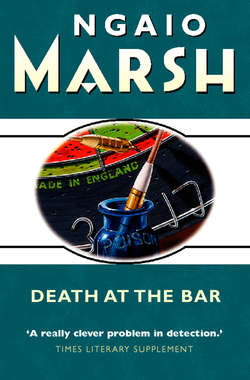Читать книгу Death at the Bar - Ngaio Marsh, Stella Duffy - Страница 19
III
ОглавлениеOn the day following the thunderstorm, the patrons of the Plume of Feathers tried very hard to remember in some sort of order, the events of the previous evening; the events that followed Mr Legge’s entrance into the private taproom. For one reason and another their stories varied, but no doubt the principal reason for their variation might be found in the bottle of Courvoisier ’87 that Abel Pomeroy had brought up from the cellar. That was after Mr Gill had gone home, and before Mr Oates returned from a somewhat curtailed beat round the village.
It was Watchman who started the discussion on brandy. Watchman apparently had got over whatever unfriendly mood had possessed him earlier in the evening and was now as communicative as he had been silent. He began to tell legal stories and this he did very well indeed, so that in a minute or two he had the attention of both bars; the patrons of the public taproom leaning on the bar counter and trying to see into the other room. He told stories of famous murder trials, of odd witnesses, and finally of his biggest case before he took silk. He did not give the names of the defendants, only describing them as the embezzling experts of the century. He had led for the defence of one of them and had succeeded in shifting most of the blame to the other who got, he said, a swingeing big sentence. He became quite exalted over it all.
Sebastian always said that his cousin would have made an actor. He was certainly an excellent mimic. He gave a character sketch of the judge and made a living creature of the man. He described how, after the verdict, when the defendant’s house was sold up, he had bought three dozen of brandy from the cellar.
‘Courvoisier ’87,’ said Watchman. ‘A superb year.’
‘Me cousin Byronie,’ said Miss Darragh, looking round the corner of her settle, ‘had the finest cellar in County Clare, I believe. Before the disaster of course.’
Watchman started and stared at Miss Darragh in confusion.
‘Dear me, Mr Watchman,’ she said composedly, ‘what is the matter with you? Had you forgotten I was here?’
‘I – it sounds very ungallant, but I believe I had.’
‘What brandy did you say, sir?’ asked Abel, and when Watchman repeated mechanically, “Courvoisier ’87,” Abel said placidly that he believed he had three bottles in his own cellar.
‘I picked ’em up when old Lawyer Payne over to Diddlestock died and was sold up,’ said Abel. ‘Half-dozen, thurr was, and squire split ’em with me. I think that’s the name. It’s twelve month or more since I looked at ‘em.’
Watchman had already taken three glasses of Treble Extra and, although sober, was willing to be less so. Parish, suddenly flamboyant, offered to bet Abel a guinea that the brandy was not Courvoisier ’87 and on Abel shaking his head, said if it was Courvoisier ’87, damn it, they’d kill a bottle of it there and then. Abel took a candle and went off to the cellar. The three men in the public taproom went away. Will Pomeroy left the public bar and came to the private one. He had shown little interest in Watchman’s stories. Legge had gone into the ingle-nook where he remained reading a book on the Red Army in Northern China. Watchman embarked on a discussion with Cubitt on the subject of capital punishment. Soon it became a general argument with Decima, Cubitt and Parish on one side; and Watchman, dubiously supported by Mr Nark, on the other.
‘It’s a scientific necessity,’ said Mr Nark. ‘The country has to be purged. Cast out your waste material is what I say and so does Stalin.’
‘So does Hitler if it comes to that,’ said Cubitt. ‘You’re talking of massed slaughter, aren’t you?’
‘You can slaughter in a righteous manner,’ said Mr Nark, ‘and you can slaughter in an unrighteous manner. It’s all a matter of revolution. Survival of the fittest.’
‘What on earth’s that to say to it?’ asked Cubitt.
‘We’re talking about capital punishment in this country aren’t we?’ Decima asked.
Throughout the discussion, though she had launched several remarks at Watchman, she had not spoken directly to him. In each instance Watchman had answered exactly as if the conversation was between those two alone. He now cut in quickly.
‘I thought so,’ said Watchman. ‘My learned friend is a little confused.’
‘I regard it,’ Decima continued, always to Cubitt, ‘as a confession of weakness.’
‘I think it’s merely barbaric and horrible,’ said Parish.
‘Terrible,’ murmured Miss Darragh drowsily. ‘Barbarous indeed! If we can’t stop men from killing each other by any better means than killing in turn then they’ll persist in it till their dying day.’
Cubitt, with some difficulty, stifled a laugh.
‘Quite right, Miss Darragh,’ he said. ‘It’s a concession to the savage in all of us.’
‘Nonsense,’ said Watchman. ‘It’s an economic necessity.’
‘Ah,’ said Mr Nark with the air of one clutching at a straw, ‘ah, now you’re talking.’
Abel came back with a bottle in his hands.
